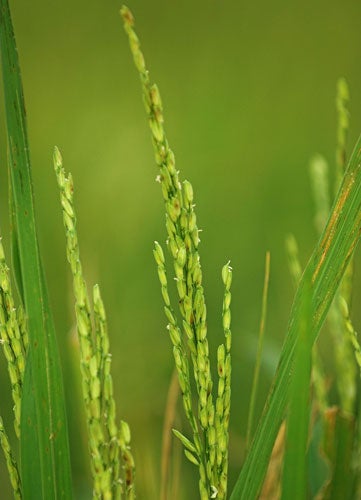'Miracle rice' gives Uganda hope of its own green revolution
Early success in team's attempt to double rice production to end food crisis

In the fertile fields of Uganda there are the first green shoots of a possible answer to the food crisis. The green revolution of the 1960s which saw food production catch and outstrip population growth for the first time left Africa behind.
That revolution was driven by a drought and disease-resistant wheat designed by an agronomist from Iowa that yielded unprecedented harvests in Latin America and Asia. Norman Borlaug is not as famous as he should be for a man credited with saving more lives than anyone in history but he was rewarded with the Nobel Peace Prize.
Uganda's bid to copy the Borlaug's revolution is built on a new breed of rice that can grow in the drier uplands instead of the traditional wetland paddy fields and has doubled the country's production in only four years. Uganda's early success is the first indication that the bid by the Coalition for African Rice Development -- a group of development agencies, led by Japan -- to double rice production on the hungriest continent could work.
Luke Kiggundu, a first time rice farmer in the village of Namaliri, north of the capital Kampala is trying to make it work. With fields of red earth surrounded by thickets of guava trees, heavy with wild passion fruit vines, farming here ought to be easy. It's not, the 34 year old explains. Grand schemes have come and gone but the area remains dirt poor, and dominated by subsistence farming.
Tired of past failures he is determined to stick with rice: “Whatever I get I will plant again next season.”
The advantages of rice over the traditional Ugandan staple matoke are several. The bananas take far longer to ripen, are harder to harvest and cook and worth a fraction of the price at market.
“ It's relatively easier to farm [rice],” he says. And if it comes off: “It's worth more money for the family.”
The man working as hard as anyone to make sure it does deliver is Tatsushi Tsuboi, a rice expert with the Japan International Cooperation Agency (JICA). He believes that something special is happening in Uganda where he is teaching advanced farming techniques to local producers.
“ It's a paradise,” he says, gesturing at the lush upland vegetation. “The soil is still young and the rainfall is very nice.”
An enthusiast from a long line of Japanese rice farmers, he speaks with excitement of the possibilities of the New Rice for Africa (NERICA). A “miracle crop” it combines the high yield of Asian rice with the hardiness and drought resistance of African rice varieties.
One kilogram of seed produces 50 kilograms of seed inside one season, he says. “Then we ask them to give two kilograms of that seed to other farmers.”
Within a year a farmer can then harvest three tons of rice.
It's this potential that has seen Uganda go from having 400 rice farmers in 2004 to nearly 40,000 today. The area under cultivation has risen from 10,000 hectares to an estimated 160,000 ha.
Uganda, like many other African countries, has a growing taste for rice but until recently it imported half of what it ate. “That is money that could be better spent on other things,” says Kasaija Herbert, a Ugandan working with JICA.
Across sub-Saharan Africa nearly $2bn of badly needed money is being spent on rice grown outside the continent. Uganda is already saving $30m a year on rice imports by growing more of its own.
The result is that farming has become fashionable. Uganda's Vice President Gilbert Bukenya has become a strong advocate of food self sufficiency, recently declaring that: “By farming smarter, Ugandans not only can grow more, they can earn more money.”
None of this would be possible though without a dose of what African leaders have been told for decades is a dirty word -- “protectionism”.
Western governments, the IMF and World Bank have all lectured Africa on free trade and open markets while rich countries continue to spend an estimated $1bn a day on subsidies to their own farmers.
African countries can't afford to subsidise their farmers and have faced punitive measures if they tried to defend them with tariff barriers.
Mr Bukenya and others decided to buck this trend with a 75 percent tariff on imported rice and this as much as Africa's new rice is responsible for the budding green revolution, according to Ugandan agronomist Robert Anyang.
“ Rice pays because of the tariff, without the tariff where would we be? Nowhere.”
In Mr Anyang's office a portrait of Norman Borlaug hangs on the wall. Now 95 years old, the Laureate is president of Uganda's Sasakawa agriculture agency. His younger disciple, Mr Anyang says: “East Africa can't afford subsidies but we can use tariffs.”
Fast growing, high yielding, easy to store and quick to cook it's easy to see why many Asian societies thought that rice was the link between earth and heaven. What was once a luxury in Uganda is now a daily diet.
“ Fifteen years ago Ugandans thought rice was just for Christmas,” says Mr Anyang.
Join our commenting forum
Join thought-provoking conversations, follow other Independent readers and see their replies
Comments
Bookmark popover
Removed from bookmarks